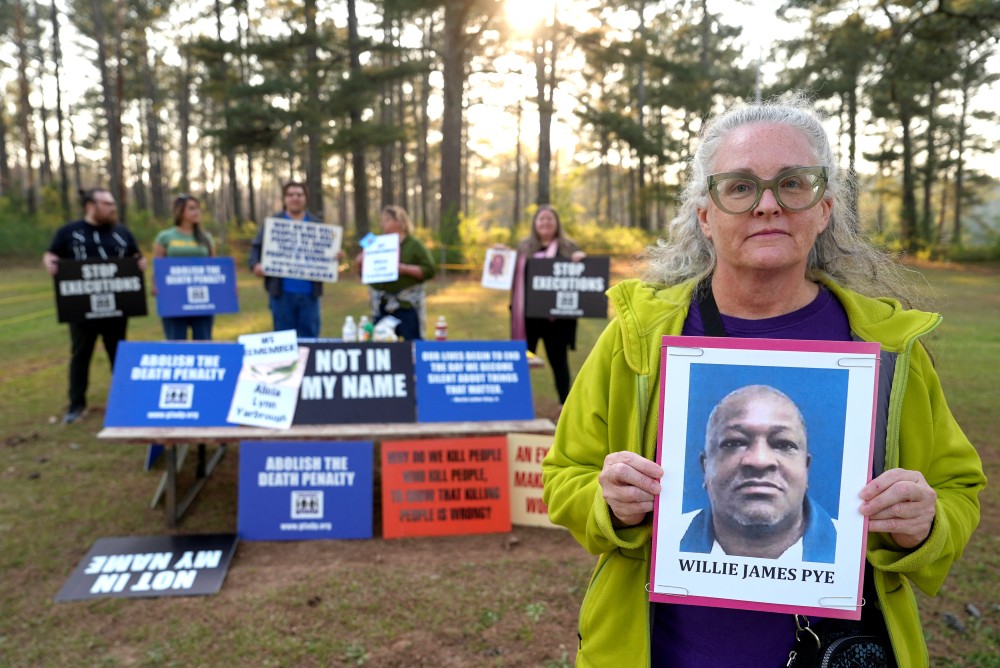
By Kate Scanlon
WASHINGTON (OSV News) — Catholic Mobilizing Network, a group that advocates for the abolition of capital punishment in line with Catholic teaching, urged its supporters to speak out against what it called a “regressive” trend of five executions in five states in the span of one week.
Krisanne Vaillancourt Murphy, CMN’s executive director, said in a Sept. 23 statement her group is organizing its supporters to voice their opposition to the spate of executions.
“Simply stated, instead of offering real justice or authentic healing that victims and communities need and desire, executions endorse and perpetuate the cycle of violence,” Vaillancourt Murphy said. “As Catholics, we believe in the dignity of all human life, no matter the harm one has caused or suffered.”
Vaillancourt Murphy called the upcoming Respect Life Month, observed every October, “a timely opportunity to proclaim that each of us is made in God’s image.”
Her statement also noted that World Day Against the Death Penalty is Oct. 10.
“In the face of such death-dealing this week, we have a sacred responsibility and the moral agency to usher in the change we seek,” she said, adding, “As people of faith and hope, we must shine our light ever brighter in this present darkness. Together, we not only can turn back this regressive tide but also generate such a groundswell that a tipping point comes to wipe out the unholy and unjust use of state-sponsored killing in America once and for all.”
An execution was carried out Sept. 20 in South Carolina, with two more, in Missouri and Texas, taking place Sept. 24. A fourth execution, in Oklahoma, took place the morning of Sept. 26, and a fifth execution was scheduled for the same day in Alabama.
“The five scheduled executions in the month of September display the horrific injustice that runs rampant throughout this system of capital punishment,” Vaillancourt Murphy said. “Several of the five individuals facing execution have histories of extreme trauma and abuse, or diagnoses of severe mental illness. One is a Black man who was sentenced by an all-white jury. Two men hold strong claims of innocence. And one of the men scheduled to be executed previously survived a failed execution attempt at the hands of the state.”
Former President Donald Trump, the Republican presidential nominee, has pushed for expanding the use of the death penalty. In 2020, President Joe Biden, with Vice President Kamala Harris as his running mate, became the first U.S. president to have campaigned on an openly anti-death penalty platform. Although Harris has opposed the death penalty in her previous roles, now as the Democratic Party’s nominee for president, her campaign has thus far not made clear whether she would work to end the practice as president.
“One can easily speculate that the uptick in executions as well as efforts to expand the use of capital punishment in certain states could be for reasons of political manipulation or signaling during an election season,” Vaillancourt Murphy said. “Politicians are known to wield the death penalty as a political tool to appear ‘tough on crime,’ treating people on death row like political pawns. We are calling on Catholics across the country, and especially in these five states, to urge decision-makers to stop these executions.”
“The death penalty is contrary to human dignity, immoral, flawed, arbitrary, and useless as a deterrent to crime,” she added. “Mobilizing Catholics for advocacy has substantial potential to advance progress toward death penalty abolition. Catholics, comprising 22% of the U.S. population, hold significant influence, particularly in key death penalty states with large Catholic populations.”
Pope Francis revised the Catechism of the Catholic Church in 2018 to clarify the church’s teaching that capital punishment is morally “inadmissible” in the modern world and that the church works with determination for its abolishment worldwide.
